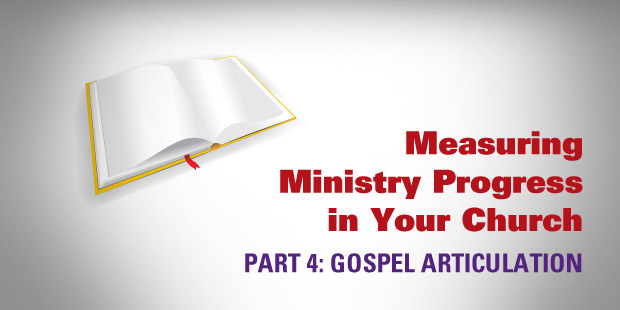
Measuring Ministry Progress in Your Church, Part 4: Gospel Articulation
Last week when I wheeled my son in his pram, down our steep driveway, I was super careful. I wasn’t taking any chances – I had precious cargo and I would do everything in my power to concentrate and carefully bring him down the hill.
We ought to treat the gospel like precious cargo. With God’s help it must be guarded, and passed down, entirely unchanged, from one generation to the next.
“Guard the good deposit that was entrusted to you—guard it with the help of the Holy Spirit who lives in us.” 2 Timothy 1:14
Sadly, as Philip Jensen has explained, the gospel can be all too easily lost. He explains how this often happens in a 4-generation process:
- The gospel is accepted.
- The gospel is assumed.
- The gospel is confused.
- The gospel is lost.
“The generation that assumes the gospel is the generation most responsible for the loss of the gospel”.
It’s too easy to assume the gospel – to assume that people know the gospel, to assume that when you encourage people to ‘share the gospel with your friends’ that people know what it is and can explain it to others. It’s too easy to assume that they have believed it for themselves.
The gospel is too precious and powerful to simply be assumed. This is why measuring gospel articulation is so important, and an important indicator of church health. Let me explain.
The importance of gospel articulation
Being able to articulate the gospel demonstrates 2 important things:
- You know the gospel. This doesn’t mean you’re saved necessarily, but it does mean that you know everything necessary in order to be saved.
- You are able to explain the gospel to others. Again, this is meaningless (and dangerous) if you haven’t accepted the gospel. But if people have accepted the gospel, and can also explain the gospel, they are powerfully equipped to do their role (and let the Holy Spirit do His) in bringing dead people to life.
How to measure gospel articulation
I think it would be very beneficial to meet up with members of your church, and ask them the question:
“What is the gospel?”
While there’s no ‘right answer’, there are core elements that must be included for the gospel to be the gospel. If these are missing, or if extra elements are added, you are able to care for these people, and help them to have a clear understanding of the
The benefits of measuring gospel articulation
I think having a better understanding of how many people in the church can articulate the gospel is helpful in a number of ways:
- It helps pastors get a better sense of who is unconverted. Not a perfect sense, but a better sense. On this topic, Mark Dever’s talk ‘False Conversions: The Suicide of the Church‘ is essential listening.
- It helps pastors know who might be serving in order to get God’s love (not in response to God’s love).
- It helps pastors avoid challenging people to live in response to the gospel, who don’t yet get the gospel.
- It stops pastors encouraging or enabling evangelism by unbelievers.
- It enables pastors to encourage people who don’t know the gospel, to explore it further.
Wise words from Spurgeon:
“Do not number your fishes before they are broiled; nor count your converts before you have tested and tried them. This process may make your work somewhat slow; but then, brethren, it will be sure. Do your work steadily and well, so that those who come after you may not have to say that it was far more trouble to them to clear the church of those who ought never to have been admitted than it was to you to admit them.”
If you’d like to equip people in your church to know and share the gospel, allow me to recommend the best book I’ve read on evangelism.
Read previous posts in this series: Part 1; Part 2; Part 3.
Read more from Steve here.

Tags: Evangelism, Gospel, Multiplication, Steve Kryger













